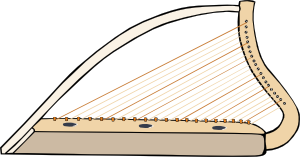Tags

Sumardagurinn fyrsti is celebrated as the first day of summer in Iceland, a tradition dating back to the use of the Old Norse calendar, which had six months of winter and six months of summer. It occurs on the first Thursday after April 18th, and marks the start of the month of Harpa. Icelandic folklore says that if winter and summer freeze together, there will be a good summer, i.e. if the temperature drops below freezing the night before.
I was listening to Hádegisfréttir on Wednesday and caught a bit of the discussion about the first day of summer; in the description of the podcast episode is the following blurb:
“Hríð við sumarkomu er talin boða gott sumar samkvæmt gamalli þjóðtrú. Þjóðfræðingur segir að það viti líka á góða uppskeru.”
“A snowstorm right before summer is thought to bode well for a good summer according to old folktales. A folklorist says it is also an omen for a good harvest.”
You see the prefix þjóð in two words above; it means people or nation, and is used in the same sense as folk in English.
|
|
|||||||||||||||||||||||||||||||||||||||||||||||||
There are two different verbs used to express the same idea, that of portending or predicting. The verb að boða looks similar to the English word bode, and is easy to recognize. The other expression is að vita á + accusative – to be an omen for something.
þjóð·trú f (-ar) folk belief aðfararnótt the night before hríð f snowstorm upp·sker/a f (-u,-ur) harvest, crop há·tíð f celebration, festival tíma·tal n (-s) calendar
Gleðilegt sumar!
